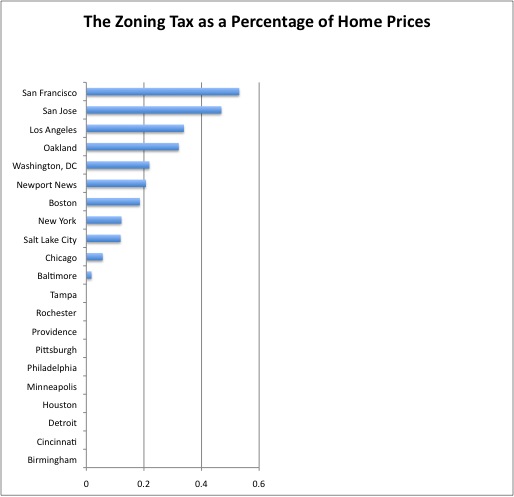Last week I wrote a post highlighting how important it is for major cities to have places for low-income people to live. Without the opportunity to live in vibrant, growing cities, our nation's poor can't take advantage of the employment and educational opportunities cities offer. My post … [Read more...]
The need for low-quality housing
The market urbanism axiom -- permitting housing supply to increase is key to achieving affordable housing -- has been made recently by Rick Jacobus at Shelterforce and Daniel Hertz at City Observatory. However both argue that even with an increasing supply, low-income people will need aid in order … [Read more...]
Reforming Zoning in a Kludgeocracy
To market urbanists and many others, it's clear that there is a positive relationship between high housing costs and land-use restrictions and that liberalizing zoning would lower housing costs relative to what they would be in a more regulated environment. Given this relationship, reducing zoning … [Read more...]
A Public-Private Shopping Mall
Forest City Enterprises recently received approval from Arlington County to redevelop its Ballston Common Mall. The deal is a public-private partnership in which the county will pay for $10 million in infrastructure improvements around the mall and provide $45 million in tax increment financing for … [Read more...]
The deal-making behind the Silver Line
In political transactions, players cannot make deals using dollars, but nonetheless they engage in trades to pursue their goals. Policymakers may engage in trades both with other policymakers and with private sector actors . While these deals are not denominated in dollars, their gains from trade … [Read more...]
How land use regulations hurt the poor
Sandy Ikeda and I have published a new Mercatus paper on the regressive effects of land use regulation. We review the empirical literature on how the effects of rules such as maximum density, parking requirements, urban growth boundaries, and historic preservation affect housing prices. Nearly all … [Read more...]
Smart city data and political opportunism
The term "smart cities" encompasses the interaction of the Internet of Things, the urban environment, and city dwellers. While these innovations have facilitated some very successful new services, smart cities have important limitations in the public sphere. Smart city technology includes city … [Read more...]
Shell Games in NIMBYism
Yesterday the Cato Institute hosted an event featuring William Fischel's discussion of his new book Zoning Rules! with commentary by Mark Calabria, Matt Yglesias, and Robert Dietz. Fischel explained his theory that zoning was an effective tool for minimizing nuisances between land uses through the … [Read more...]
- « Previous Page
- 1
- 2
- 3
- 4
- 5
- 6
- …
- 20
- Next Page »





